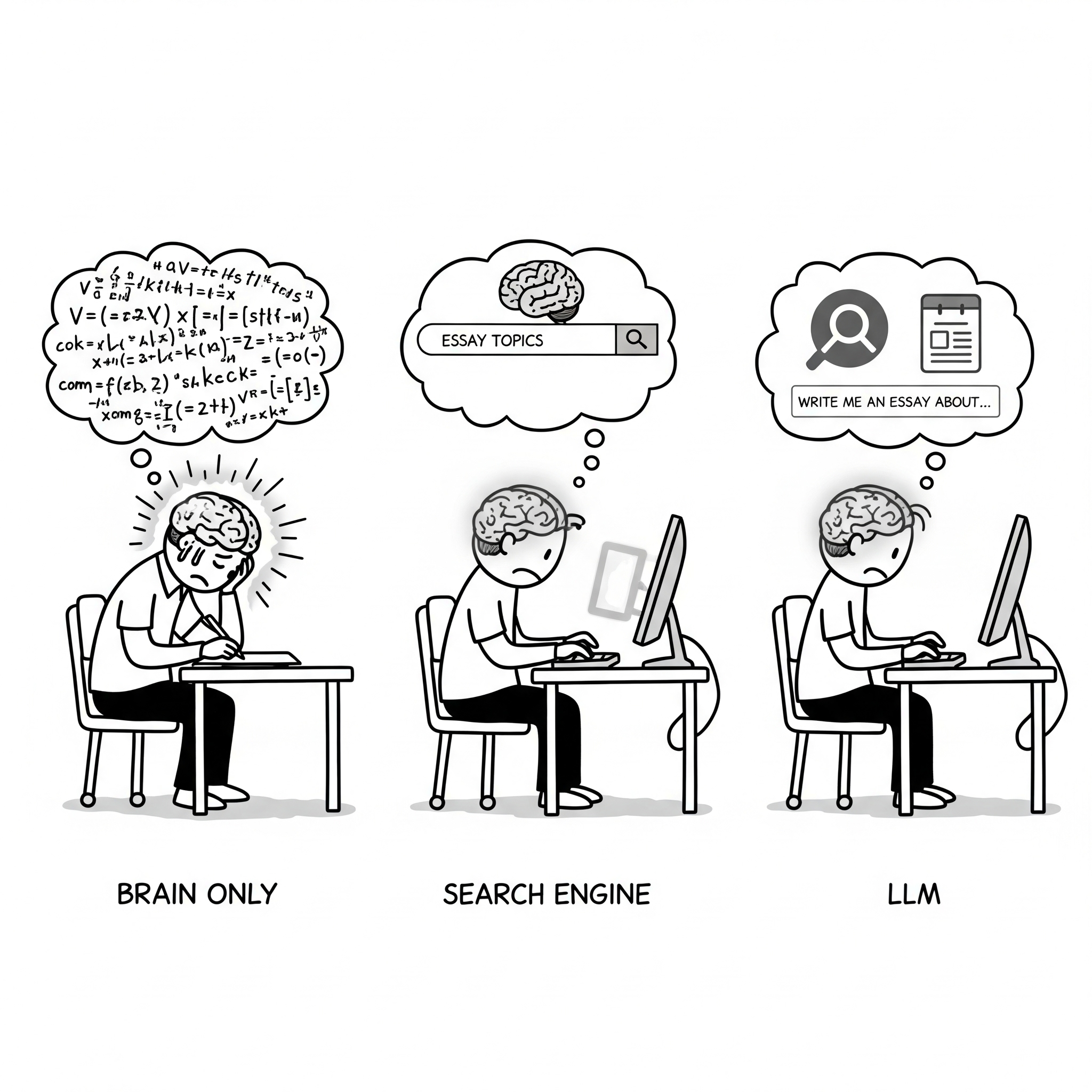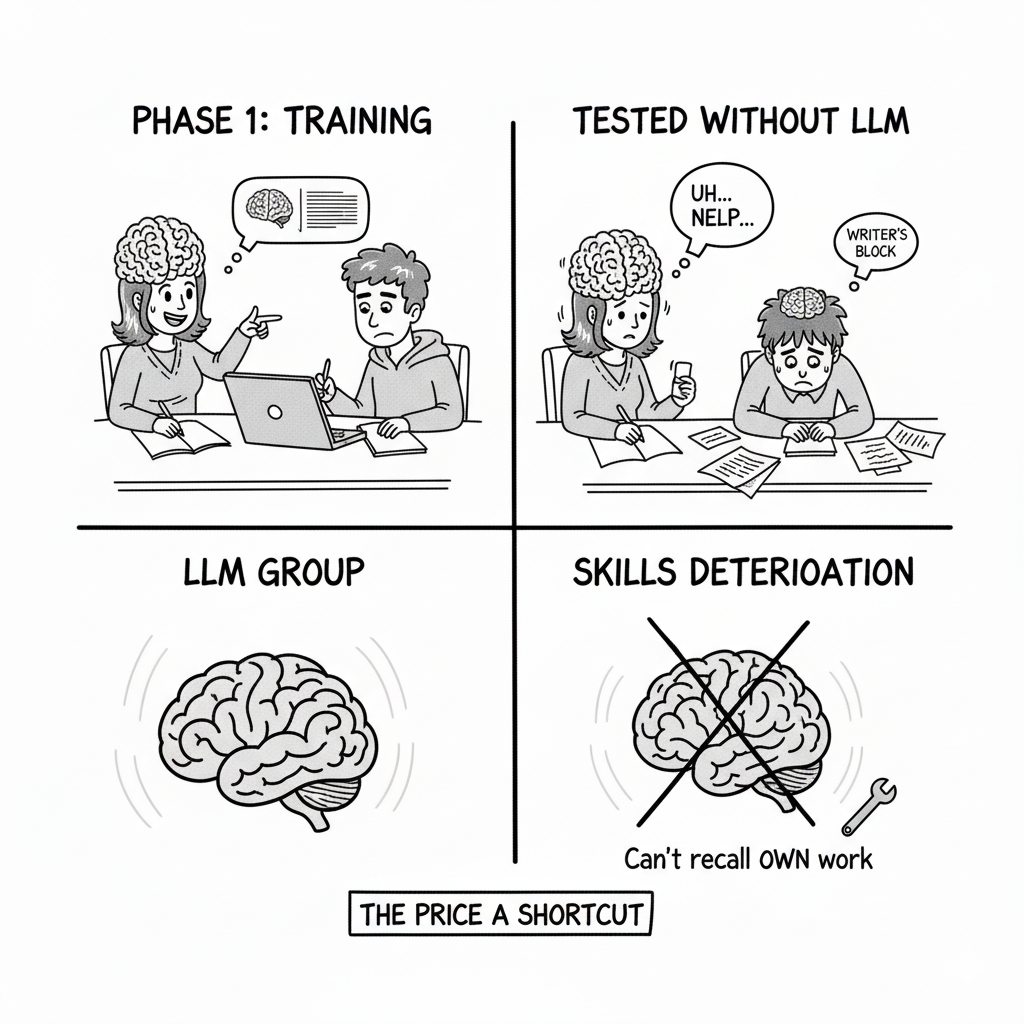Is AI Making Us Stupider?

The pen is a powerful tool. For centuries, it has been the primary instrument for turning our most complex thoughts into tangible words. The physical act of writing, the struggle to articulate an idea, has long been understood as a fundamental part of thinking itself. But what if that pen suddenly became a phantom limb, replaced by an invisible assistant that offered polished prose with a few keystrokes? What does it cost us, as thinkers and learners, when the hard work of writing is outsourced?
A compelling study from the MIT Media Lab offers a disquieting glimpse into this future. The researchers, in a paper titled "Your Brain on ChatGPT," suggest that our growing reliance on AI for creative and intellectual tasks may be leading to a quiet but profound change in our cognitive landscape. They call it "cognitive debt"—a mental toll accumulated when we consistently offload the heavy lifting of thinking to a machine.
The study, a rigorous look at how the brain responds to different writing methods, is less a condemnation of AI and more a profound inquiry into the nature of human cognition itself.
A Tale of Three Groups
The experiment was elegantly simple. A group of 54 university students were asked to write a series of essays over several months. To understand the impact of modern tools, the researchers divided them into three distinct groups:
- The Brain-only group was the control. They were given a pen and paper—or a blank document and a keyboard—but were forbidden from using any external tools. Their minds were their only library.
- The Search Engine group was permitted to use Google. This represented the modern but still effortful approach to research, requiring participants to actively hunt for and synthesise information from diverse sources.
- The LLM group was given exclusive access to ChatGPT. Their task was to use this powerful AI tool to assist in their writing.
To track the brain's activity, the researchers used electroencephalography (EEG) to measure the flow of information between different brain regions. What they discovered was a clear and consistent pattern: the less mental effort required by the task, the less the brain engaged.

The Brain-only group's brains were a hive of activity. They showed the strongest and most widespread neural connectivity across all frequency bands. This intense communication between brain regions is a signature of deep, complex thought—the very process of forging new ideas and connecting them to existing knowledge.
In contrast, the LLM group's brains were eerily quiet. Their neural networks showed the weakest overall coupling, with some networks displaying up to 55% less activity compared to the Brain-only group. The AI, in essence, became a cognitive crutch. Instead of actively generating ideas and building arguments, the students' brains were in a mode of passive supervision, merely editing or accepting the AI’s polished output.
The Price of a Shortcut
The true cost of this cognitive shortcut became chillingly clear in the study's final phase. A subset of the LLM group was brought back for a fourth session and asked to write an essay without any tools. The results were dramatic. These students struggled immensely, displaying a significant decline in their ability to think and write independently.
Perhaps most damningly, a staggering 78% of these former AI users were unable to recall a single correct quote from their own essays, a stark contrast to their peers who had consistently worked without AI. The neural pathways for deep semantic encoding and memory retrieval, which the AI-free students had been actively strengthening, seemed to have atrophied from disuse.
This finding suggests a troubling notion: the more we rely on AI to perform a task for us, the less capable we become of performing that task ourselves. The convenience of the AI-generated essay may be masking a decline in the very skills that the essay is meant to cultivate.

A Cautious Path Forward
The researchers are quick to point out the limitations of their study. The sample size for the final session was small, and the research was focused on a very specific task in an educational setting with younger age group. We must be careful not to generalise these findings to all forms of human-AI interaction. Future research, perhaps using more precise imaging techniques like fMRI, will be needed to fully understand the long-term effects of this new technological frontier.
However, the implications are clear. This study is a powerful reminder that our brains are not passive vessels for information. They are dynamic, adaptable organs shaped by the demands we place upon them. As we stand at the precipice of a new era of AI-driven productivity, we are faced with a choice: will we use these tools to augment our cognitive abilities or to avoid the hard work of thinking altogether? The answer will determine not only the future of our work but the very architecture of our minds.
Comments ()